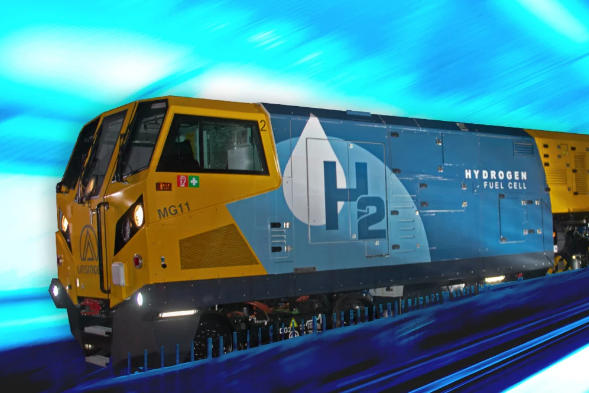Bruck’s Free Voters want a concept for buses. Puchheim company already uses the technology in a construction train.
There has already been enough talk about it. Now the Free Voters of Fürstenfeldbruck finally want to make progress with a technology of the future, from which they expect an important contribution to climate protection: fuel cells powered by hydrogen could replace combustion engines under certain conditions. It is conceivable that they could be used as “range extenders” in electric cars, which would then require a smaller battery – the Puchheim-based company Proton Motor is conducting research in this area.
Free Voters City Councilor Markus Droth wants to advance the technology in the area of mobility with “green hydrogen,” and he has his eye on heavy-load and bus transport in particular. Here there is “currently an innovation push”. In the application to Mayor Erich Raff (CSU), Droth advocates the development of a concrete strategy – in the sense of climate-neutral local public transport in the district. The aim is to cooperate with the municipal utilities. The focus is on the CO₂-neutral production of hydrogen, primarily with the help of wind power and solar energy, as well as the necessary infrastructure. Droth would like to see pilot projects for which there would be subsidies from the federal and state governments.
In his justification, Droth points to the county seat’s self-commitment to climate neutrality by 2035, a central component of which is “transportation and, in particular, local public transport.” Without the electrification of cars, trucks, and buses, it will not work. Initial talks with a manufacturer of electrolysis plants – with the involvement of the municipal utilities – have shown that the municipal utilities “will play a central role in the production and distribution of hydrogen. In the upcoming tenders for new bus lines in the eastern part of the district, the new orientation must be taken into account: “The bus operators, in particular, need a perspective because they have to invest millions in their fleets. This can only be done with planning security and with start-up financing from the federal and state governments.”
Hydrogen technology could indeed be on the verge of a breakthrough, at least in some areas of vehicle technology. Admittedly, there is still a long way to go before it is truly ready for series production in cars – because of its lower efficiency compared to batteries and the lack of a filling station network. But for trucks and other heavy vehicles, the technology seems very suitable to at least complement batteries. Proton Motor, the Puchheim-based developer of fuel cells, now announces another milestone after fuel cell packages (stacks) have already been installed in five garbage trucks of the Dutch-Belgian company “E-Trucks Europe” as range extenders.
Now one locomotive is being equipped with Proton technology. This is a hydrogen-powered rail milling train, which is thus free of exhaust gas and noise. The type “MG11-H2” of the world market leader for rail milling machines, the Upper Austrian “Linsinger Maschinenbau Gesellschaft”, has now been officially presented at the company headquarters in Steyrermühl. Proton Motor will supply a customized hydrogen fuel cell system for the first special rail construction machine of this type. The MG11-H2 high-performance milling machine has a purely electric drive, with hydraulics also being completely dispensed with for the working units. The emission-free technology comes into its own, particularly in rail tunnels.







